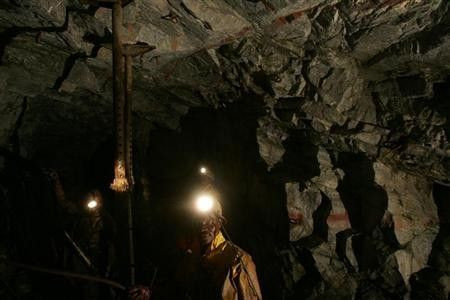Tanzanian mining stumbles through 2011

Tanzania's mining sector grew only slowly this year due to uncertainty over government policies, a prolonged energy crisis and infrastructure constraints, a senior mining official said on Thursday.
Mining growth in Africa's fourth-largest gold producer slumped in two consecutive quarters this year.
There have been numerous commissions over the past few years appointed to review the mining sector. This has created some atmosphere of uncertainty as investors became anxious over which direction the country was taking, said Ami Mpungwe, chairman of the Tanzania Chamber of Minerals and Energy.
We have been sliding backwards ... there is anxiety either over instability or lack of clarity and this has caused a slowdown of investment, he told Reuters on the sidelines of a mining conference in the northern town of Arusha.
Mining growth slowed to 5.8 percent in the second quarter of this year against the 20.5 percent of the second quarter of 2010, according to the state-run National Bureau of Statistics
(NBS).
The sector also expanded to an annual 2.1 percent in the first quarter of 2011, down from 28.3 percent in the first quarter of 2010.
The value of gold exports rose by 19.3 percent in 2010 to $1.46 billion, largely due to a rise in gold prices at the world market.
Mpungwe said Tanzanian miners were unable to take advantage of a surge in world commodity prices due to production constraints in east Africa's second-biggest economy.
The power crisis has certainly affected growth of the mining sector. The cost of production has been high because of power and infrastructure challenges, he said.
TANZANITE SMUGGLING
The mining sector contributes to less than 3 percent of Gross Domestic Product (GDP) in the country, compared to the communications sector which accounts for 20 percent of economic output.
Tanzania drafted a new mining policy in 2009 and enacted a new mining legislation in 2010 aimed at restructuring the sector to ensure earnings are fairly shared between investors and the country.
Under the new law, the government raised royalty payments on key minerals such as gold, diamonds and uranium, and changed the formula for calculating taxes on minerals from netback value to gross value.
The changes also permit the government to own a stake in strategic mining projects in future and required mining companies to list on the Dar es Salaam Stock Exchange (DSE) after they start commercial production.
The government said it was also considering introducing a super profit tax on earnings from minerals as one of the ways to fund its five-year development plan.
Tanzania, the world's only source of tanzanite, announced a ban on the export of the raw gemstone from April 2010.
The ban increases smuggling and has reduced government revenue. The only people compliant of this are companies like us, the rest don't have the capacity to cut and polish the gemstone, said Mpungwe.
He said Tanzania could regain its position from Mali as Africa's third-largest gold producer next year if it addressed production constraints.
The acting minerals commissioner, Ally Samaje, said at the conference the government was committed to improve the investment climate with a stable and predictable mining regime.
© Copyright Thomson Reuters 2024. All rights reserved.





















